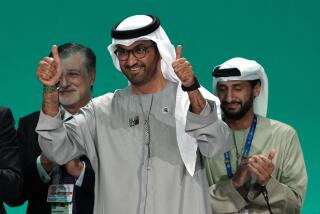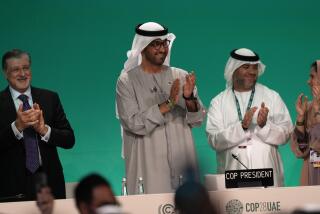Analysts See Problems for OPEC in Its Accord : Oil: Leaders, conceding they have a credibility gap, set up a panel to watch for above-quota production.
- Share via
VIENNA — OPEC’s new accord to cut output may stabilize oil prices for now, but the producers’ club has set up more problems for itself in the future, industry analysts said Wednesday.
Markets reacted cautiously to the deal OPEC ministers wrapped up Tuesday night that is designed to chop--at least on paper--about 1.4 million barrels of oil a day from actual production now of about 25 million, starting March 1.
“Seeing is believing,” said Peter Gignoux, head of the London energy desk for Smith Barney, Harris Upham, who was watching for concrete evidence that OPEC was implementing the deal. “Suspicion remains that words speak louder than deeds.”
Traders had largely expected a pact of this configuration, so had moved prices for international benchmark Brent North Sea crude up near $18 a barrel from lows of less than $17 in January.
Brent futures contracts for April delivery opened 15 cents a barrel lower at exactly $18 in muted London trading as markets failed to reward OPEC with a big price jump. In New York, oil for March delivery closed 20 cents lower at $19.33 a barrel.
“The agreement has already been absorbed by the market,” one broker said. “We are going to stay in a range of $17.70 to $18.30 for now.”
Still, a host of potential pitfalls awaits the Organization of Petroleum Exporting Countries as the 12-nation group tries to make the deal stick.
Kuwaiti Oil Minister Ali Ahmed al-Baghli, who helped draw out the group’s strategy talksfor four difficult days, said he will be keeping an eagle eye on his OPEC colleagues’ output discipline and immediately join in any quota-busting.
“We shall abide by this agreement by the figure given to us . . . but at the first sign that the others are not respecting their commitments under that agreement, we shall take the appropriate action,” he told reporters.
OPEC leaders conceded that they have a credibility gap. They set up a three-man compliance committee to watch out for “leakage,” or above-quota production.
And when ministers meet again in June, they seem likely to confront once again what was the thorniest issue at the Vienna talks: OPEC’s obligation to Kuwait--or lack thereof--as the emirate reconstructs from the ruinous 1991 Gulf War.
Kuwait argued successfully that in return for rejoining OPEC’s system of output quotas at a ceiling it thought too low, it should get special guarantees allowing it to boost production once demand starts to pick up after June.
OPEC’s final communique in fact includes language that Kuwait should get quota parity with similar producers--Kuwait has the United Arab Emirates in mind--once the current agreement expires July 1.
Delegate sources said Iran led objections to putting this pledge down in writing, thus creating what some members see as a precedent for the day Iraqi crude returns to the market.
Sooner or later, the United Nations will lift its oil embargo punishing Baghdad for sending troops into Kuwait in 1990. This will create a major headache for OPEC countries suddenly facing disagreement over the production cuts needed to make room for Iraq.
Iraq was represented at the Vienna talks only by its ambassador to Austria, who called OPEC’s accord “nonsense.”
More to Read
Inside the business of entertainment
The Wide Shot brings you news, analysis and insights on everything from streaming wars to production — and what it all means for the future.
You may occasionally receive promotional content from the Los Angeles Times.










